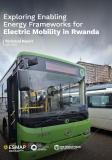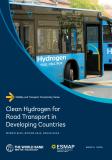Publications
In April 2009, the Egyptian Ministry of Finance, with support from the Prime Minister, initiated the Vehicle Scrapping and Recycling Program for the Greater Cairo Region (GCR). Under this initial phase, a taxi replacement and recycling program was launched on a voluntary basis, where private taxi owners receive financial and other incentives to surrender their old vehicles for new, more fuel-efficient models, while the old vehicles are scrapped and recycled.
The program was launched to support enforcement of Traffic Law 121, which went into effect on June 9, 2008, and targets improvements in air quality and reduction of greenhouse gases (GHG) associated with Egypt’s aging fleet of taxis, microbuses, minibuses, and buses. With an initial focus on taxi replacement in the GCR, a collaborative effort between the government and private sector in the GCR offers an attractive financial package to attract owners of taxis more than 20 years old to participate. This includes a 25-30% reduction in the price of a new, replacement vehicle, €2,500 in subsidies and tax waivers, discounts on the loan terms and insurance agreements, and other incentives. The estimated total program cost would be about $620.24 million, depending on the number of participants, share of each model, etc.
The program will remain active for 28 years, replacing 45,000-50,000 taxis in the GCR during the first phase. Then, pending approvals, taxis and other mass transport vehicles in other regions would be replaced in later phases. The first phase will reduce emissions by an estimated 1.3-2.3 million tons CO2e over 10 years. The project will be supported by carbon financing, which will support development of a recycling facility for the scrapped vehicles. As of 2009, a total of 17,000 taxis had already been replaced, resulting in 57,233 tons CO2e emissions reduction and a 29% reduction in energy use.
ESMAP. 2010. Good Practices in City Energy Efficiency: Cairo, Arab Republic of Egypt - Taxi Scrapping and Recycling Project. ESMAP Energy Efficient Cities Initiative. Washington, DC: World Bank.



